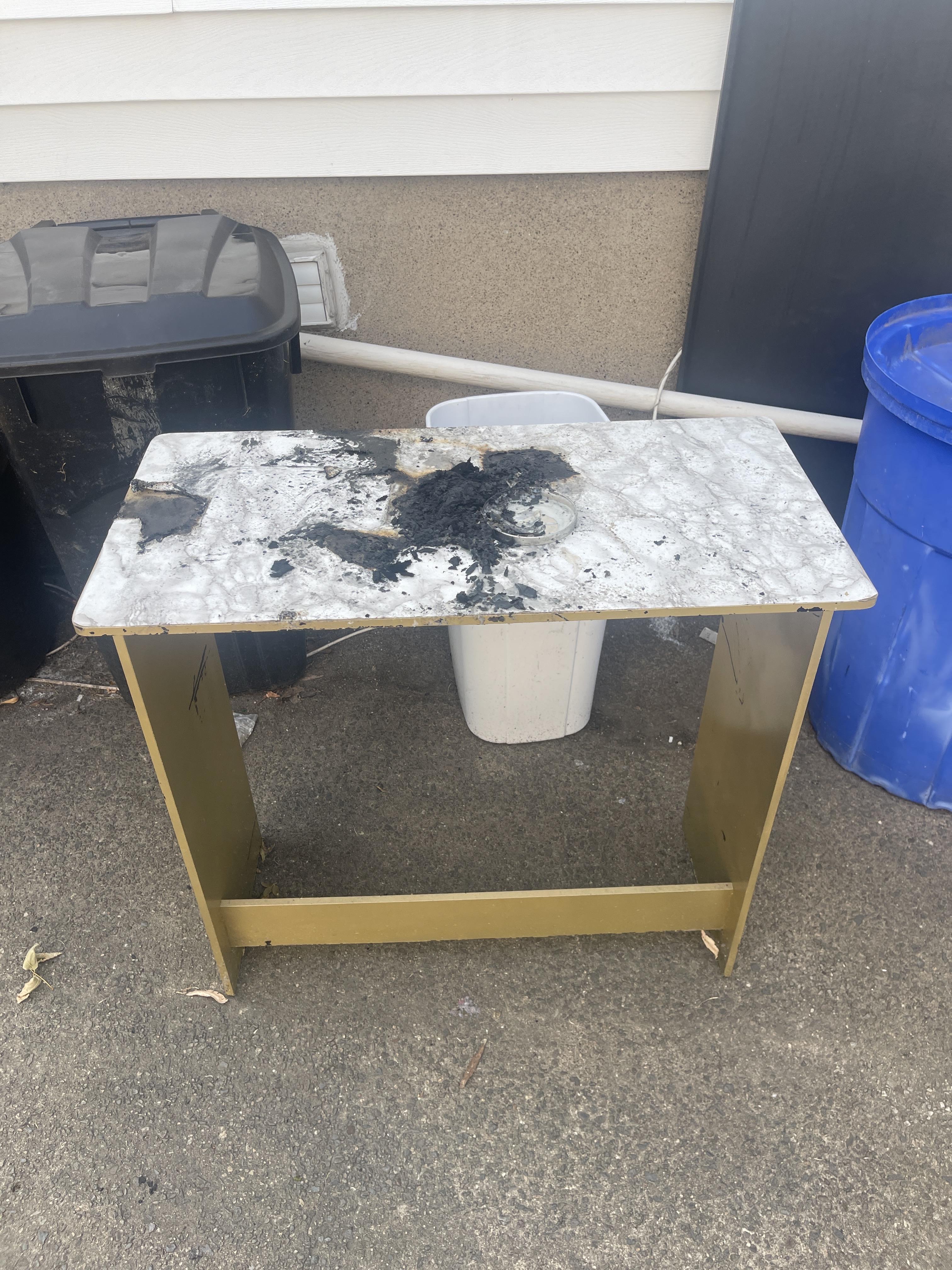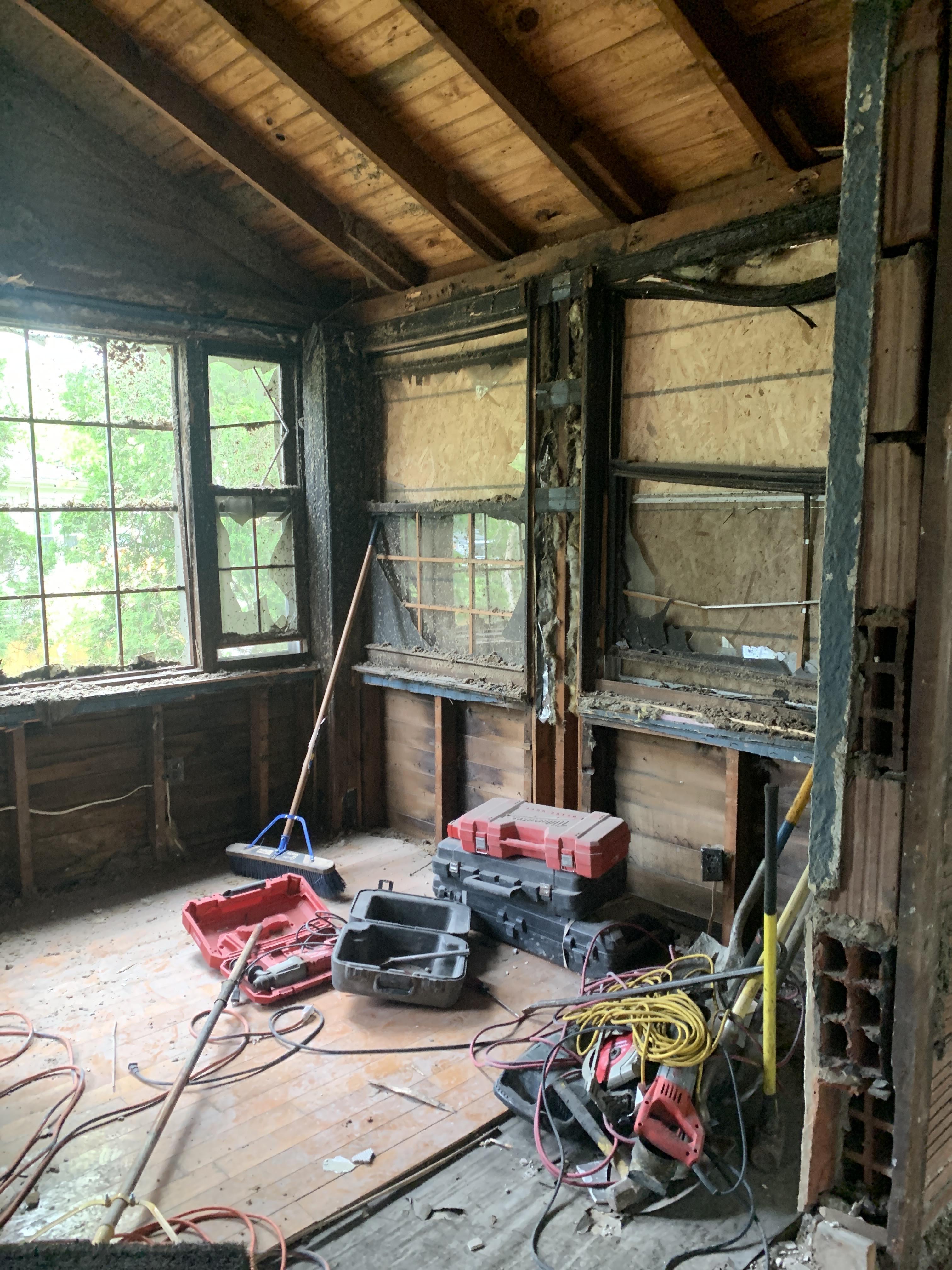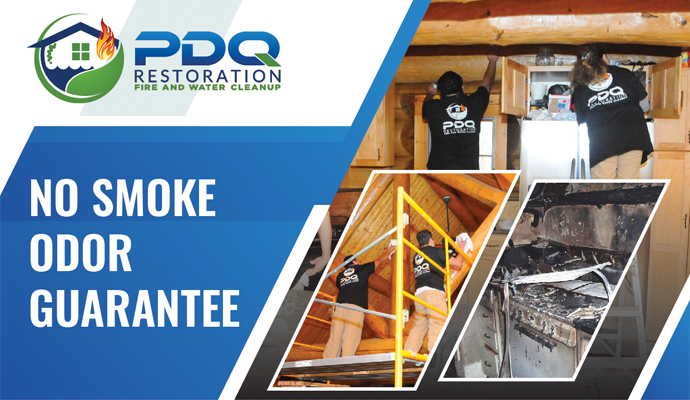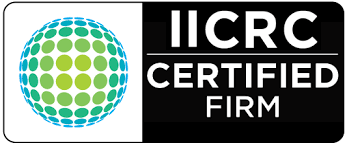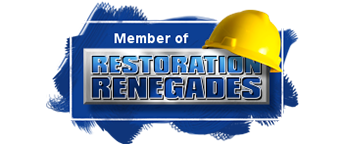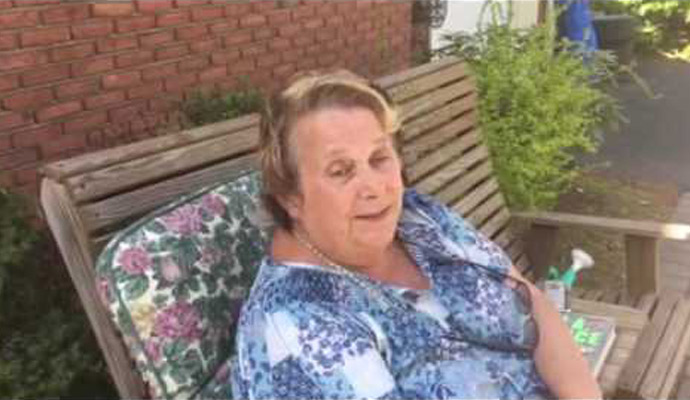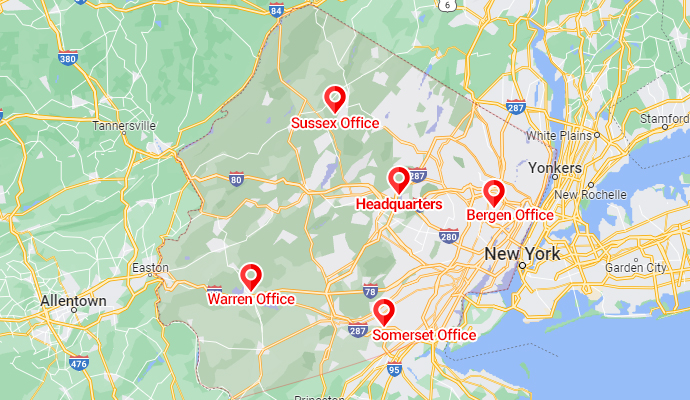What Do You Do After a Kitchen Fire?
The kitchen is usually the busiest place in your home. Preparing meals and entertaining, the kitchen is where most of your family interactions take place. The devastation of a kitchen fire not only interrupts your daily living but can cause significant damage to your home and require extensive cleanup.
If you experience a small kitchen fire, many things need to be done, once it is contained and you are ready to start repairing and restoring your home. But with the right advice and tools, the process can be easier than you might think.
What Causes Kitchen Fires?
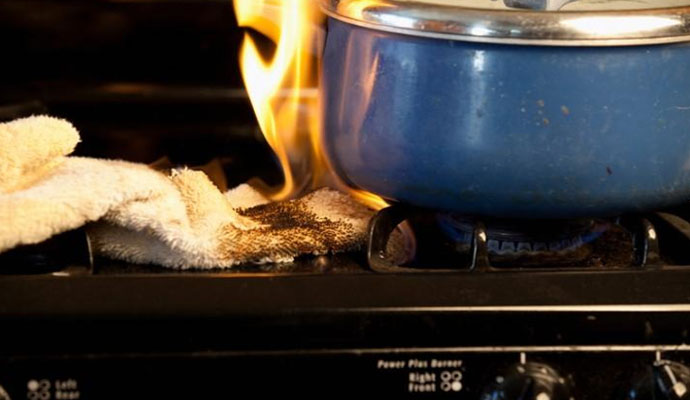
A cooking fire is the most common source of a kitchen fire. The majority of kitchen fires happen because of a grease fire. A grease fire starts when cooking oil used to fry ingredients becomes too hot. It doesn’t take long for cooking oil to heat up to 500 degrees Fahrenheit and ignite.
A kitchen fire can originate from an oven fire, stove fire, or microwave fire.
- An oven fire can happen because food scraps left in the oven catch fire; you forgot you were cooking something and it catches on fire; grease or fat can splatter and cause a flame; batter from a cake you are baking can overflow and start a fire on the bottom element.
- A stove fire occurs with unattended cooking; flammable objects are left next to the stovetop; a burner is turned on but not used; cooking oil or grease splatters and starts a fire
- A microwave fire starts when something is put in the microwave that is not approved for microwave use; food is overheated; packaging gets caught near the wave emitter on the side of the machine and can burn, (microwave popcorn is a big culprit of this.)

How to Prevent and Put Out a Kitchen Fire
There are very simple ways to prevent kitchen fires:
- Never walk away from the food you are cooking
- Do not leave flammable objects, like paper towels, dish towels, or food packaging near heat sources
- Install smoke alarms and regularly check to make sure they are working
- Keep a fire extinguisher within easy reach, in case a fire starts
- Suffocate a flame that starts in a pan, by sliding a lid over the top of it
- DO NOT use water to put out a grease or oil fire
- If a fire starts inside your oven, keep the door closed and let it just burn on its own; call 911 if it does not go out.
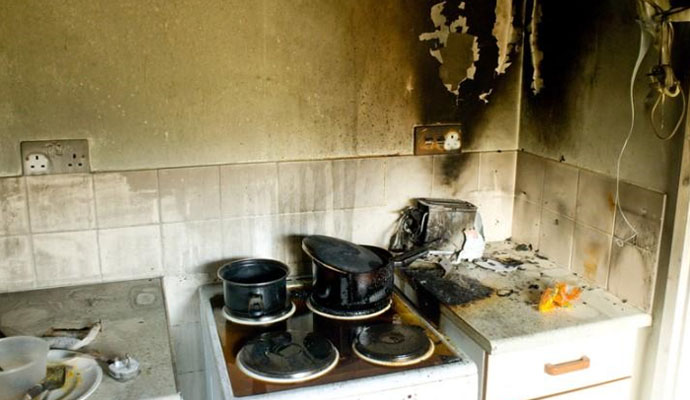
How Fire/smoke/odor Damage is There?
Once you can get back into your kitchen, after you have talked with your restoration company, and you have been given the go-ahead to return to your home, begin to assess the damage caused by the fire. Take pictures and videos of the damage, everywhere. Inside cabinets and drawers, inside appliances, furniture, absolutely every item and surface that has been affected by the fire, smoke, and soot.
Either update or validate your home inventory of kitchen items. You’d be surprised by just how many items you can have in your kitchen! From the table in the breakfast nook, down to the last wire whisk, document everything that was damaged.
Safety First

Once the fire is completely out, and you have been able to return to your home, make sure that it is safe to go back inside your kitchen. Either the fire department or your insurance adjuster can let you know when you can go back inside.
The fire department can also let you know if the electrical systems and gas lines have been inspected and are safe to use. Do not use either of these without first knowing it is safe to do so.
Since a fire leaves behind toxic materials, protect yourself by wearing appropriate protective coverings: high rubber boots, gloves, a mask, long pants, and sleeves.
When you’re working in the kitchen, you need to be concerned about your health. Do not eat or drink anything while cleaning and restoring your home.
Before you start the process to clean the kitchen, start by opening all the windows and turning off your air conditioner to keep the soot from contaminating the ductwork in your house.
Start the Cleanup
Next, comes one of the hard parts, but again, necessary to protect the health of your family.
Discard any contaminated items. Soot seeps into surfaces and is full of toxic chemicals. If something looks like it is ruined, it probably is. Don’t run the risk of keeping any items that could end up being hazardous to your health.
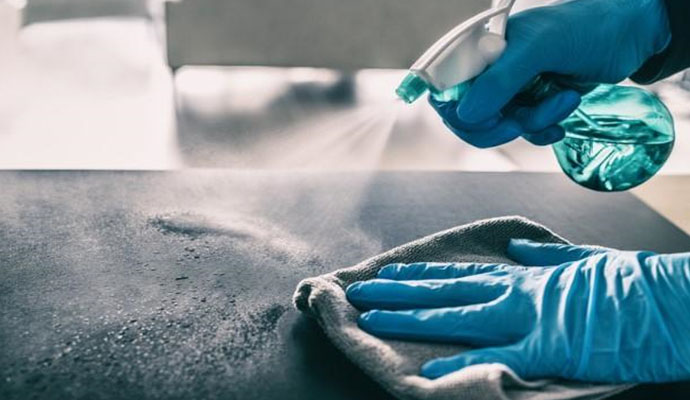
One thing that will help make the cleanup process easier is to buy or rent a heavy-duty HEPA certified vacuum. Holding the vacuum tube just above the surfaces, vacuum everything. By holding the tube above the surfaces, you won’t be dragging soot along, which can stain surfaces. HEPA vacuuming first also makes washing the surfaces so much easier. Keep black trash bags handy so you can empty the vacuum regularly.
Remove the cabinets, doors, and drawers, and wipe down all the interior spaces. A lot of soot will settle on areas that you cannot readily see, so getting behind and in between hard-to-reach places will be a must. You’ll wipe down all appliances and steel and metal surfaces with a dish detergent, rinse, wipe with bleach, (if it is safe to use bleach,) rinse, and wipe again with more soap and water.
Smoke and soot can get into the inside components of your appliances. While you may be able to thoroughly clean away the dust and dirt, you may not see the damage smoke and soot can cause. Have an expert inspect your appliances if you are unsure.
Thoroughly clean your dishes, pots, pans, silverware, serving utensils, everything. If you have a jar of toothpicks, throw out the toothpicks, and clean the jar. It cannot be stressed enough that soot is tiny particles that cling to surfaces. Any porous surface either has to be completely cleaned or if it cannot be cleaned, discard it.
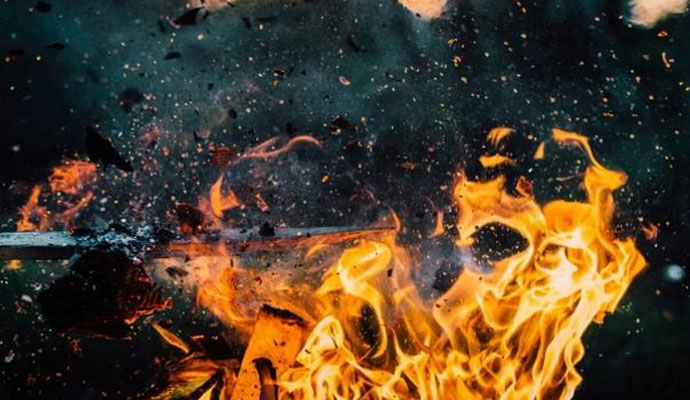
Removing Odors
Smoke can travel far when there’s been a fire and the odor left behind is strong, oftentimes intolerable to live with. You can try placing open containers of strong coffee grounds inside your cabinets and leave the doors closed to try and remove the odor. Vinegar is also helpful in absorbing odors, so setting out bowls filled with this may also help.
Once you have completely cleaned everything and every surface, change the filters in your appliances and your HVAC. Place the old filters in black garbage bags for disposal.
If you have areas of carpet close to your kitchen, sprinkle baking soda over all of it, wait for one hour, then vacuum. Use an air freshener spray that contains cyclodextrin (molecules in these air fresheners are made from cornstarch, which is a natural odor trapper).
When to Call in Professionals
As mentioned before, if you are dealing with a small kitchen fire, you may be able to do a lot of the cleanup work yourself. But, realize that soot is a toxic, sticky substance that does not like to be removed by just elbow grease. Everything in the vicinity of the kitchen fire will be affected by soot, smoke, and fire damage.
A professional fire restoration company, like the trained technicians at PDQ Restoration, use commercial HEPA air scrubbers to filter the particulate matter out of the contaminated air. Also used are hydroxyl generators which deodorize and sanitize the air.
There may also be structural damage you are unable to see. Professional fire cleanup technicians can properly assess and repair structural damage. Part of this restoration is not only removing and replacing damaged areas but also properly cleaning and sealing before putting everything back together again.
If you aren’t sure what to do and you feel you need help after you’ve experienced a kitchen fire in your home, reach out to our experienced fire restoration team for an inspection. We want to help you get your family’s life back to normal as soon as possible.


